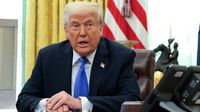On March 24, 2025, President Donald Trump announced a 25% tariff on countries that purchase oil and gas from Venezuela, marking a significant escalation in U.S. efforts to pressure President Nicolás Maduro's regime. The tariff, referred to as a "secondary tariff," follows Trump's assertion that Venezuela has sent "tens of thousands" of criminals, including members of the Tren de Aragua gang, into the United States.
This new measure is set to take effect on April 2, coinciding with what Trump has termed "liberation day in America," representing a broader strategy to undermine Venezuela's oil industry and make it more challenging for countries like China to operate there. In a post on Truth Social, Trump stated, "Any Country that purchases Oil and/or Gas from Venezuela will be forced to pay a Tariff of 25% to the United States on any Trade they do with our Country." He added, "Venezuela has been very hostile to the United States and the freedoms which we espouse."
Trump's administration has been previously accused of overreaching in its efforts to curb Venezuelan influence, particularly after designating Tren de Aragua as a foreign terrorist organization. Earlier this month, on March 15, Trump invoked the Alien Enemies Act to justify deporting alleged gang members, drawing sharp criticism from human rights advocates.
The tariffs will primarily target countries like China, which is the largest buyer of Venezuelan oil. Reports indicate that the U.S. imported approximately $5.6 billion in oil and gas from Venezuela in 2024, while Canada's exports dominated at a staggering $106 billion. Critics argue that these new tariffs could damage U.S. trade relationships and have minimal impact on the Maduro regime, which has faced increasing economic isolation.
In his post, Trump emphasized that this initiative comes after the U.S. scrapped a license allowing Chevron to operate and export oil from Venezuela, a decision stemming from the belief that Maduro had not done enough to address electoral reforms and return migrants. The deadline for Chevron to wind down operations was set for April 3, suggesting a tight timeframe in which to comply.
Trump has also faced challenges in implementing his immigration policies. A federal judge recently blocked an attempt to deport Venezuelans under the Alien Enemies Act, indicating a potential legal battle ahead. However, many deportations have proceeded, raising questions about due process and the treatment of individuals deported as alleged gang members.
As the April 2 deadline approaches, the implications of the tariffs are still unfolding, with markets showing mixed reactions to Trump’s threats. U.S. crude oil prices rose slightly by 1.04% to $68.99 per barrel on March 24, while the global benchmark, Brent crude, increased by 0.93% to $72.83 per barrel. Financial analysts suggest the stock market may not react strongly to these latest announcements, noting a possible disconnect between Trump's rhetoric and market realities.
In conclusion, Trump’s new tariffs serve as a critical tool in his administration’s ongoing strategy to isolate the Maduro regime and reshape energy trade dynamics. Whether these moves will successfully strengthen the U.S. position vis-à-vis Venezuela or risk long-term economic repercussions in international relations remains to be seen.







